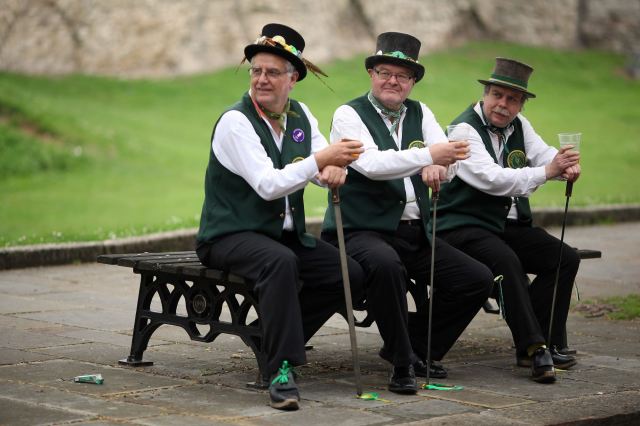Morris dancers mark the arrival of the spring, and a sharp divide between city and village. (Photo by Dan Kitwood/Getty Images)

Nicky Poole works as an account executive for a hipsterish media agency called That Lot. They do social media brand management, image consultants for the digital age. In December 2016, she set up a Twitter account called @CrapLocalNews.
It began as a bit of office fun, a competition between colleagues to see who could get the most Twitter followers in a month. And there is no denying it is funny. Every day the account tweets out absurd headlines taken from local newspapers. “Mystery goat tied to post in Maidenhead High Street”, and “Woman taken to hospital after being knocked over by a cow in a field in Hethel”, are two of the more recent offerings. Though my favorite was the breaking news that “a Swansea town council is considering getting a colour photocopier” – imagine being the reporter sent to sleuth around after that one.
Now, I mustn’t get all morally superior about this, because I can’t help but laugh at it too. Nonetheless, there is something about @CrapLocalNews that I find just a little bit too smug – the metropolitan distain of young media trendies sitting in their central London offices poking fun at the dullness of parochial life.
Of course, this has long been a fault-line in English culture since at least the 18th century, with the English novel – Jane Austen, Thomas Hardy etc – continually returning to the divisions between town and country, between the parochial and the cosmopolitan. And it is there much further back too: think, for instance, of the urban snobbery of imperial Rome, the sneering attitude towards the provinces and their lack of cultural sophistication.
Globalisation has done something different to this well-worn theme. Air travel, international markets and a revolution in communications technology has meant that the cultural and economic elite of different regions of the world are able to live and work together, almost irrespective of geography. Just as the global elite become ever closer to each other, also they become increasingly distanced from those who live, as it were, parochially – even when sharing the same geographical space as them.
The word parochial derives from the Latin word for parish, paroecia – the parish being the basic unit of ecclesiological governance in this country since the Archbishop of Canterbury, Theodore of Tarsus, was sent here in the 7th century and revolutionised the structure of local decision-making. Since then, for the last millennium and a half, the church developed and then maintained a parish system in this country, establishing a local parish church and a local parish priest at the very heart of every local community.
But now, if you look up the world parochial in the thesaurus, you find this:
“…narrow-minded, small-minded, provincial, insular, narrow, small-town, inward-looking, limited, restricted, localist, conservative, conventional, short-sighted, petty, closed-minded, blinkered, myopic, introverted, illiberal, hidebound, intolerant…”
Whereas the local community used to be the principle site of human flourishing, it is now something to escape from. Politicians call it social mobility, and they think it an unalloyed good thing that anyone with any gumption and “get up and go” will do precisely that. If you are born into a strong, thick, traditional community, if you come from somewhere provincial and parochial, it has become almost a duty to yourself to leave such places to go and find your way in the world. In the world of liberal individualism, deracination becomes a moral obligation. It is the price of individual flourishing.
Back in 2003 and 2004, The Idler magazine website invited its readers to nominate Britain’s “crappest” towns. Hull won in 2003 and Luton in 2004. These become the places from which young people especially are encouraged to escape. Luton-born Safraz Manzoor had it exactly right when he wrote about the resulting book:
“There is an air of unmistakable snobbery around the people behind such a book; the stench of rich kids having fun at the expense of those less able to afford to be professionally idle.”
As a parish priest for over 20 years, my commitment has always been to the parochial. Yet as a journalist, I inhabit newsrooms where the flow of information is constant, where things move fast and the reality of world events is ever-present. The fantasy of such places is that, because of their hyper-connectivity, they have their noses pressed up hard against reality.
Perhaps the most important thing about Brexit is that it has revealed this disconnect and forced us all to face it. Sunderland (third crappest town in the UK in 2004, according to The Idler survey) led the charge on 23 June 2016. This was the much maligned and unheard voice of the parochial.
But there are still those who will not listen. That Lot was co-founded by the actor and comedian David Schneider in 2003. He’s a funny, talented guy. And he is good at poking fun – that’s his job. He recently tweeted: “I’m off on a short Twitterbreak to write a telly thing about Brexit. It’s a farce with loads of really bleak humour. And so is the telly thing.”
His twitter account is a continual flow of jokes about Brexiters and how stupid they are. It reflects the easy moral superiority of the globally networked media existence, and the laughter of those who look down upon the parochial as little more that a source of crap local news. Little wonder people are so angry.










Join the discussion
Join like minded readers that support our journalism by becoming a paid subscriber
To join the discussion in the comments, become a paid subscriber.
Join like minded readers that support our journalism, read unlimited articles and enjoy other subscriber-only benefits.
Subscribe